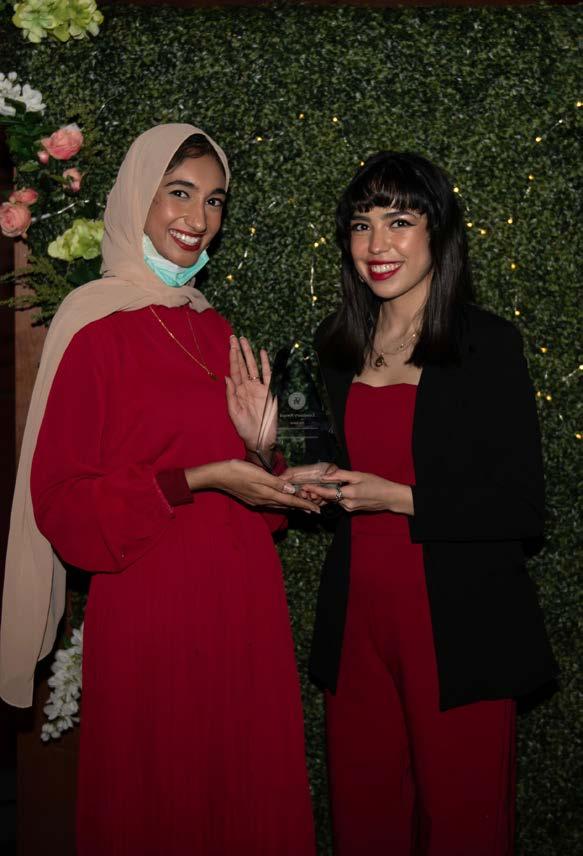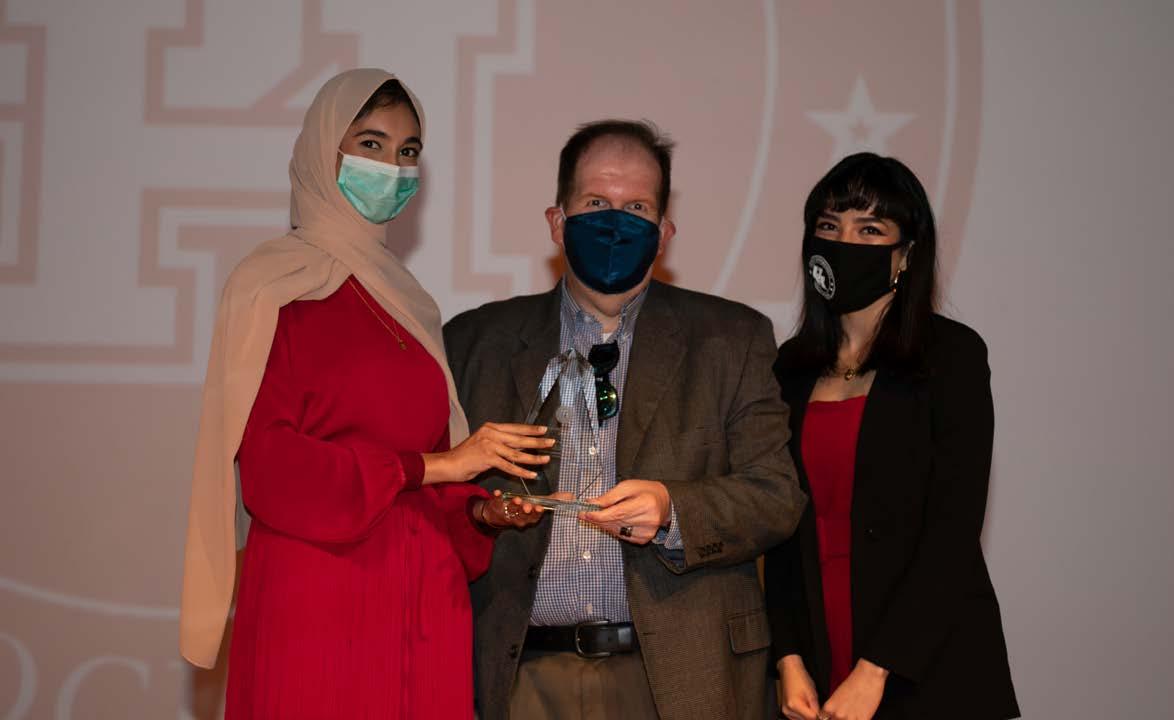
12 minute read
An interview with the 2020-2021 SGA President
2020-2021 Student Government Association President Jasmine Khademakbari reflects on her time at UH and gives a message to the class of 2021
Advertisement
Photo by Kathryn Lenihan/The Cougar
By Autumn Rendall
Jasmine Khademakbari has served in the Student Government Association since her sophomore year.
The 2020-2021 SGA president started UH in 2017 and graduates this May with a B.A. in mathematical biology and a minor in Mexican American studies. Khademakbari first was elected to SGA as a senator for the College of Natural Sciences and Mathematics, and in the following year she ran for SGA president as a junior. During her time as president, which ended April 1, she served as the bridge between the student body and the University. She is most proud of her administration for being outspoken about racial injustice, the bill they wrote in honor of George Floyd, and being committed to being a leader in diversity. As she looks back on her time here, Khademakbari feels so much love for the University and is so grateful for the time she spent here. Now that her chapter of being an advocate for the student body has come to a close, she hopes to be an advocate for women of color, the LGBTQIA+ community, and leaving every place that she goes better than she found it.
Q: What do you hope the next administration continues from your administration?

A: So when I ran for student body president I wanted to be the kind of leader that SGA wasn’t going to be necessarily about me, it wasn’t going to be about just policy changes on the University level, but it was going to be trying to change our leadership and amplify student voices that have historically not been amplified in the past. So it was really important for me to give those students a platform to speak on their own issues. So one of the examples that actually inspired me to run in the first place was I was a student life Chair of a Senate committee that we had, and we review legislation as they come in, and somebody had written a bill to do some Center for Students with Disabilities reform, so the CSD reforms. And at the time I asked them, “Well, did y’all consult any students who were utilizing the CSD to try to make these reforms?” And they said no, and we didn’t end up passing that bill through committee because I thought that those students, although they had a representative, it wasn’t coming from them. So that’s when I decided to run and I recruited students, international students, transfer students, students with disabilities, and a very diverse Senate race, so we could have an SGA that was truly representative of the diversity in our school. So what we ended up doing is that these people got elected. And we have two senators, Senator Mady Chidester and Senator Jonathan Sasser have been leaders and instrumental in leading these policy changes now because they finally have a seat at the table. And whenever leaders have a position of power, like even something as small as SGA, you have the power to recruit people to your team that can make real change. So why not recruit the people who have been historically overlooked in the past. And so that’s something that I made a huge focus of my team in my administration, so we could amplify those voices. So I hope that the next SGA will not only amplify those voices, but not stay silent when the rights of certain students are on the line are being talked about. It’s important that we don’t stay silent. Some people expect us to be non-biased, right, but we shouldn’t be when some students are being attacked for things that they can’t control. It’s important that they have leadership that is there to back them, and not just back the University, but really back the student body. So I hope that they do that.
Q: Has your term as SGA president changed you? And if so, how?
A: Oh, my gosh, I don’t even
2020-2021 SGA Vice President Hiba Rashid (left) and President Jasmine Khademakbari (right) at the 2021 SGA Banquet | Photo courtesy of Jasmine Khademakbari
think I look like anything like what I did when I first ran. So I don’t know if it was just SGA or the quarantine or the mixture of both. Yeah, there’s a lot of things that happened in a year that made us all change and all adjust. But yeah, no, I’ve changed immensely. Because I mean, even virtually, somebody needs to step up and be a leader. You have to manage a cabinet when you’re SGA President and that’s like eight people, people who have different values. They’re not necessarily just like you, they have different opinions. They have different work styles. So, you know, hopefully, I’m sure every SGA President has gone through this. You learn how to be a good leader, you learn how to collaborate with other people, and you learn that your opinion isn’t necessarily always going to be right. The decisions that you make aren’t always going to be the right decisions and that’s OK because everyone makes mistakes and sometimes you just have to do the best that you can. So I’ve definitely learned to be a better leader and a better manager. I had the opportunity to work with my cabinet and others in the SGA, and they taught me so much just about how to be even a better person. I subscribe very highly to the notion that you can learn something from every single person that you come in contact with. And I’ve learned so much from every single one of my Cabinet members. And like, I mean, even like, my VP is extremely righteous. And her righteousness inspires me when I feel that I am giving up on a cause that I probably shouldn’t be giving up on. And so when she is that determined, it teaches me to be more determined. My chief of staff is a huge supporter. He is like the most supportive person. If you have a goal, or you’re trying to work towards something, he’ll always be there for you, he’ll support you, he’ll give you a pep talk. And so I’ve learned to do that with others. I’ve learned to not be so naive, and not just believe that everybody has good intentions all the time. That’s something that one of my Cabinet members pointed out to me like, some people might not have your best interests at heart. So keep that in mind. Even though he always told me like, I know, you want to believe in people, but you can’t always believe in everyone. So I mean, I’ve learned so much from being able to work on a team. And I think the biggest thing that I’ve really taken away from it is that any sort of position of power that you have any sort of success that you have, it doesn’t really mean anything, unless it means something to other people. So having them at the forefront of everything that you do will make you a better person, it makes you a better leader, it keeps you humble. I mean, I still have imposter syndrome from this whole thing when people know who I am. Sometimes I’m just like, what on earth? It’s just important that we have an open mind. And we just, we let people teach the lessons that they’ve learned in their lives to us.
Q: What’s your favorite part of being SGA president?
A: I would say just knowing that you’re making an impact, that is something that brings me a lot of solace to know that people are really thankful for the things that we were able to accomplish. And like, before I was SGA President, I felt very alone in my struggles. As a student, I felt very isolated. Whenever I was struggling, I’ve always worked and gone to school. So I felt very isolated in that experience. Before I became SGA president, really balancing the two, I had problems with my mental health. I just felt very alone at times. And then when I ran for my senate campaign, and then also for the presidential campaign, you have to talk to students, otherwise, you can’t develop a platform or anything. So when I was out there, and I talked to other students, I realized how not alone I was in all of these struggles, my struggles with mental health, with trying to balance work and school. At the time, you know, the loss of my house and Hurricane Harvey, even things that go a little bit deeper, like being in like an abusive relationship and being a survivor of sexual assault. It’s things that you might think you’re alone in your struggle, but when you talk to other people, you realize that you’re not alone. And there’s something very, very comforting about that. It brought me a lot of peace to know that other people were also suffering. And then it inspired me even more when I got to a place where I could advocate for these people. I was advocating for myself, but I was also advocating for others. And that inspired me to just to keep going and to try and make an impact and change the lives of other people and then in turn changing my life and the lives of future students as well. I mean, just knowing how much we were able to help students with the interim grading policy with some of the reforms that we did over the summer. I hope that students knew that they had leadership that was really thinking about their best interests and weren’t thinking about the best interest of the University or what was going to make the University the most profit but truly thinking about what was going to be best for students that were currently in school and students in the future as well and setting new precedents for the standard of how student government should be run.
Q: How will you remember UH when you look back on the time you spent here?
A: Oh my gosh, I love UH. When I was in high school I was super nihilistic. I hated school spirit, and I could never imagine myself being one of those people who love their school so much. And here I am about to graduate, and I love that I went to U of H. I’m so proud that I went to U of H. I
think that U of H is unique in that it provides an opportunity for people to go to college at an affordable price and have a very quality education that maybe like weren’t going to go to college or wouldn’t have gone if they didn’t have somewhere like U of H. One of my favorite stories from U of H, in my experience, was I walked into the library as a freshman and I saw the banner that said, “You belong”, and from somebody who was coming from a very nihilistic high school mindset where I was bullied, where I felt like I wasn’t like the other kids. I went to the library, and I saw that banner, and I finally did feel like I belonged somewhere, I looked around, and people came from the same kinds of socio-economic background as me, people not only looked like me but looked even more different. And you see, like, so much diversity, even in my own friend groups, how almost none of us come from the same background. And it’s truly unique. Like we have such a unique experience to learn from one another’s experiences. And also, we’re able to find this unity in our differences, which is even more powerful to know that people are coming from such different backgrounds and they still share similar problems and similar struggles. There’s something very unifying in that, and I think that’s something that the U.S. and our country could really learn from right now is how unifying diversity really is. It’s not as polarizing and as dividing as people seem to think it is. It’s truly like one of the most unifying experiences is to go to a very diverse university with quality professors. I mean, I found mentorship here that I never thought I would find. I had Latina professors who are successful. I’ve never seen somebody, like, from my own background have so much energy, so much poise, and I’ll shout out Dr. Farfán-Santos for really doing that for me. She’s one of the anthropology professors, and she really inspires me. And it’s really important to go to a university that cares about having diverse faculty members. So everyone can have that experience, can have somebody who looks like them really be a mentor for them.
Q: Is there anything that you would like to say to the class of 2021?
A: We are so resilient, that’s for sure. Because if you’re from the class of 2021, then you probably came in around the time that Hurricane Harvey hit, and you are leaving at the tail end of a pandemic, but not really the tail end of a pandemic. So I mean, if you made it this far, what can you not accomplish? The world hit so much at us these last four years, maybe five or six years for some graduates. But we persisted, we persisted and we made it and we didn’t lose sight of our values. And we made it. We believed in ourselves, and we made it. So it’s something to be very proud of. Our class of 2021 is extremely resilient. And I mean, now, we don’t know what the economy is gonna look like, we don’t know what the next disaster is gonna look like. But you know, if we survive this one, then we can survive the next one.

From left to right: 2020-2021 SGA Vice President Hiba Rashid, SGA Advisor Keith Kowalka, and 2020-2021 SGA President Jasmine Khademakbari at the 2021 SGA Banquet | Photo courtesy of Jasmine Khademakbari












